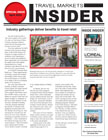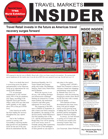 Following its announcement in January regarding the harmonization regulations issued by Mercosur at the end of 2018, South American duty free association ASUTIL will be meeting with government officials of Brazil and Argentina to clarify the list of products that had been excluded for sale in the region’s border stores.
Following its announcement in January regarding the harmonization regulations issued by Mercosur at the end of 2018, South American duty free association ASUTIL will be meeting with government officials of Brazil and Argentina to clarify the list of products that had been excluded for sale in the region’s border stores.
In a webinar on Friday morning, ASUTIL Secretary General Jose Luis Donagaray explained that while ASUTIL and its members welcomed the resolution as a first step in recognizing duty free shops on the borders, and the importance they can have on regional economies and local employment, the resolution includes a list of products that will be restricted from sale on the border, “which sets a very bad precedent for the future.”
The harmonization was drawn up without consultation with ASUTIL or other involved stake-holders, so ASUTIL will use the upcoming meetings with government officials to voice the views of its members.
“We are working with our board, and starting next week will have formal meetings with the Uruguayan government and the Brazilian government with a goal to continue selling what we have always sold in the free zones,” said Donagaray.
“Of course we agree not to sell ammunition and arms, cars, boats, motorcycles, animals, etc.,” he said.
“We don’t want to sell products of the basic basket; we don’t want to be a Walmart duty free with rice sugar etc sold as Duty Free,” he said.
Donagaray pointed out that last year, with some harmonization of allowances on the border, the industry achieved “some steps forward.”
He hopes that with these meetings the Mercosur governments will remove some of these product restrictions before April when the rules are expected to be formalized.
“This is a very important issue for the Association and the operators,” he said, adding that the wording on the restricted products is so vague and wide-reaching they appear to be designed to prevent ‘Walmart-type duty free stores’ from being built.
“We do not think the restrictions apply to our duty free stores since we just want to continue selling
what we have sold for years, so this gives me some confidence,” he said in response to a question ASUTIL is initially concentrating on Uruguay and Brazil.
Uruguay has allowed the sale of duty free goods on the border for many years, and Brazil is due to begin border sales within the next few weeks. So the current restrictions in the resolution have a direct and real impact on the business now.
Donagaray said the Association has more time in Paraguay and Argentina, where duty free border stores are not currently authorized. (London Supply’s Iguazu free shop and the stores in Ciudad del Este fall under different licensing, said Donagaray.)
Specifically, ASUTIL will be asking Merosur to issue a “negative list” of products that cannot be sold.
“We do not want to be IKEA. We agree not to sell anything that does not come under the normal duty free. But we want to sell cigarettes, we want to sell electronics, small domestics, textiles and shoes, etc.”
Donagaray says that ASUTIL has prepared a formal letter for each government explaining the issue. “We are working with the top levels of the governments and their tax and custom offices. We need to have success.”
Tobacco will be the most difficult aspect of the negotiations, he admits, but is hopeful that a system like the special taxation on cigarettes as done in Uruguay is one good solution.
Added value of duty free border stores
In his arguments illustrating the benefits of border free shops, Donagaray pointed to a study ASUTIL undertook in 2017 that showed that duty free shops account for as much as 30% of employment in some small cities in Uruguay, especially for women, and provided an alternative to relocating to the capital for a low income job. People visiting the duty free shops also supported hotels and restaurants, he said, all of which generated tax revenue for the areas.
* * *
In related news, Donagaray reported that the duty free business in South America was down 25% on average between 2017 and 2018, due in large part to the currency instability in Brazil and Argentina. Brazil has shown some stability over the last four months, and the Argentine government is buying dollars to shore up its currency, he noted.









